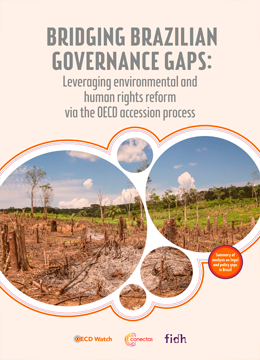Fill in your details to download the material

Bridging Brazilian governance gaps
On 25 January 2022, the Organisation for Economic Cooperation and Development (OECD) invited Brazil, along with five other countries, to begin an accession process to become an OECD member state. Full membership would bring Brazil powerful economic and political advantages, including improved standing among donors and increased access to trade and foreign direct investment. But as this paper series argues, at present, Brazil is far from being aligned with OECD standards, nor has it demonstrated commitment to the OECD’s values on the rule of law, protection of human rights, and promotion of environmental sustainability.
This summary paper uses case examples as a launch point to explore the leading causes of governance gaps in Brazil across five critical areas:
- Climate change and deforestation,
- Environmental degradation,
- Indigenous peoples rights,
- Civic space for environmental and human rights defenders, and
- Labour rights.
The report then make a simple ask of the OECD: that it use its powerful leverage during the accession process to help realise reform on rule of law, human rights, and environmental protection in Brazil, by requiring Brazil to adopt the reforms proposed as a condition for membership. The papers also ask the OECD to ensure Brazil’s and the other pending accession processes are transparent and formally inclusive of stakeholder participation.